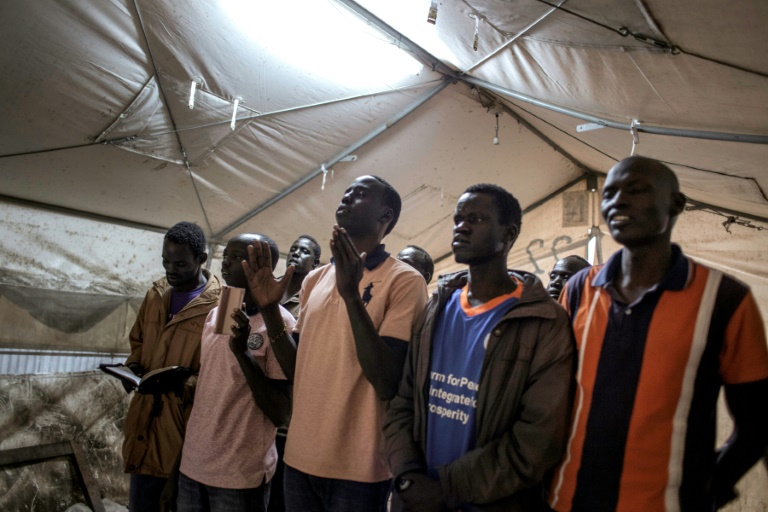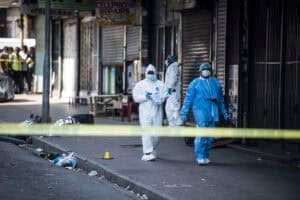The Congolese army has stepped up arrests of South Sudanese refugees and tightened the border in a bid to block rebels from seeking sanctuary in its country, officials say.
As hundreds fled into the Democratic Republic of Congo last week, after President Salva Kiir’s government army dislodged Riek Machar’s rebel SPLA-IO from its headquarters in southwestern Lasu, some 18 suspected rebels were taken into detention.
It is the first time Congolese authorities have detained a significant number of South Sudanese and may signal a change in Kinshasa’s policy towards the neighbouring country, riven by a devastating four-year power struggle.
“As of now 15 have been released. They were refugees who were arrested because they had returned to South Sudan without authorisation. Three who remain in custody are suspected of being rebels and investigations are ongoing,” said Alexis Kabambi, who heads the National Commission for Refugees (CNR) in the Congolose town of Aba.
– Border tightened –
Until recently, members of the SPLA-IO were able to move relatively freely across the border to Aba, a town they depended on for supplies and medical treatment for their wounded.
But after South Sudan’s ambassador visited Aba together with DRC’s defence minister in April, local authorities began restricting movement across the border, according to a South Sudanese community leader in Aba and an SPLA-IO official who asked not to be named.
The tightening of cross-border movements is a blow to those who return to South Sudan to harvest their fields in order to supplement their monthly cash allowance, which they say isn’t enough to feed their families.
When fighting erupted in Lasu, siblings Grace Gaba and Joseph Moro rushed back to their village to help an elderly family member across the border and to fetch some of the family’s livestock. But when they tried to re-enter the DRC, Moro was arrested.
“I haven’t heard from him since,” said Gaba, insisting her brother wasn’t a soldier.
Gaba and her brother didn’t obtain the required permission for their trip to South Sudan, which may have drawn suspicion when they tried to re-enter the DRC.
“This back and forth isn’t appreciated by the security services,” said Kabambi.
“When you return to the other side, you are suspect. You are going there for what, to communicate with those people on the other side?”
– Extradition back to S.Sudan –
Officials in the DRC suspect a close link between the refugee community and the opposition fighters.
“We know that the women and children are here in the camp while the husbands are part of the rebellion,” a police officer said at a recent community gathering in Aba’s refugee settlement.
The officer called upon ex-combatants to report themselves to the army “for their own protection.”
But young men who are sympathetic to the rebellion back home don’t trust Congolese authorities.
“I don’t know their position, that’s why I’m at risk. If I’m arrested, they could torture me and hand me over to the South Sudanese government,” said one rebel currently seeking refugee status in Aba.
The young man plans to install his family in the refugee settlement and then return to South Sudan to resume his role in the SPLA-IO.

South Sudanese ex-combatants live confined to camps in Goma, Democratic Republic of Congo
Elsewhere in the DRC, in Goma, some 400 mostly former SPLA-IO rebels have been living confined to a camp since fleeing with Machar in 2016.
They live not quite as prisoners and not quite refugees, accepting restriction of their movement in exchange for food and protection from a UN peacekeeping mission.
– Fragile ceasefire –
The SPLA-IO inked a ceasefire deal with the South Sudanese government last week but the truce is already floundering as both sides accuse each other of multiple breaches of the accord.
According to international law, third party countries are obliged to disarm and intern ex-combatants until a ceasefire comes into force or until they genuinely renounce military activities, at which point they qualify for asylum.
But procedures described by Congolese authorities appear to run counter to these provisions.
“Once you’ve borne arms, you fled and you came here, you are considered a soldier,” said Kabambi.
“The Congolese armed forces then cooperate with the government of South Sudan to see how these people can be extradited to their country.”






